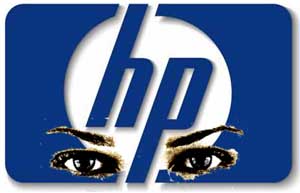
The Attorney General is extremely sheepish and wimped out over this problem and trying to get out of it. Since it did involve identity theft and perhaps other crimes done for hire. You’d think a conspiracy and perhaps a racketeering charge could easily be made. What is Lockyer afraid of?
While state Attorney General Bill Lockyer has determined Hewlett-Packard Co.’s clandestine investigation of its own board members violated the law, he says it’s still unclear whether anyone will be prosecuted.
Lockyer said today that the Palo Alto-based company’s gumshoe tactics to root out the source of a media leak violated two California laws related to identity theft and illegal access to computer records.
One of HP’s private investigators obtained the last four digits of the Social Security number of HP director Tom Perkins. The investigator called AT&T and impersonated Perkins, asking AT&T to send a record of phone calls to and from his house in December 2005 and January 2006 to a free, Web-based e-mail account.
This was in addition to the CNET reporters and others they snooped on. And you thought Apple was paranoid!















There’s definitely plausable deniability here.
A company has some kind of leak which they want to stop… they hire a third party to investigate leak, who finds the leaker and reports back to board.
The fact that third party investigator used illegal means is not the fault, nor liability of HP. Thousands of organizations and individuals hire PI’s to do such investigations (insurance scams, leaks of trade secrets, background checks, divorces, etc.). It is these investigators that must stay within the law, not who hires their services.
Let the lawsuits begin…
#1: That depends on whether someone at HP approved the use of illegal activities. My guess is that most of these PI places ask for specific approval from clients before engaging in such practices, I know I would. Of course someone at HP could have told them to use “any and all means” neccecary to find out who was leaking.
My analogy is that of the Mob boss. While he may not specifically order the murder of someone they still have been charged when they just told someone to “stop the leak”. You can’t have plausible deniability that you don’t know what’s really going on. My guess is that if they wanted they cold really nail the people at HP. The question is what is Mr. Lockyer afraid of?
Ask Frank IBC… he’ll tell you there are no conspiracies… 😛
#3: Ben, I disagree with you, at least from a legal point of view.
Unless the person who hires a PI (or whomever) specifically says to break the law, (and there are basically no legal alternatives to “get the job done”), I see no culpability.
Imagine every time a supervisor says something like “make that customer happy, whatever it takes”, the employee does something illegal (forges a company check for $1,000,000 and sends it to customer), the boss is responsible? Or the opposite, if a club owner asks the bouncer to get rid of an unruly customer, and the bouncer shoots the customer… the boss is liable?
Another thought game: Imagine if a rich person told a doctor, cure my kidney disease, I’ll pay you whatever it takes, and the doctor goes out and kills an innocent for their kidneys to transplant… Who’s the criminal?
There are many ways to catch corporate misbehavior that are not illegal (including going through a persons garbage), extensive and detailed surveillance, etc. By any means can include lots of legal, but possibly unethical behavior.
From a criminal law perspective, unless they can show the board saying “Break some laws, but find me the info”, I would never say its beyond a reasonable doubt.
From a civil suit perspective, (preponderance… etc.), maybe.
#1. lou, not quite.
If HP hired the investigators then they become HP’s responsibility. The few outs would include if HP specifically told the investigator NOT to do something or the investigators held out that they only investigate using lawful means. If HP had any reasonable expectation that the investigators had broken the law, they should have informed law enforcement in order not to be implicated.
I agree with Ed, where are the conspiracy charges? I just hope it is still a little early and they do come.
HP has a responsibility to its shareholders to investigate the leaks. The boardmembers likely waive privacy rights within the scope of such investigations. It is the 2nd party to the boardmembers calls that should not have been publically revealed. If that falls under the “oops” clause in California law, there won’t be any criminals to charge.
My favorite thing to come out of this is our US AG’s comment from Bloomberg. “Attorney General Alberto Gonzales today: ‘No one should have to wonder whether obtaining phone records without authorization is illegal.”’ We do it all the time up here in Washington. And and we’re darn fuzzy on what’s illegal or not ourselves. No one should have to wonder about this stuff.